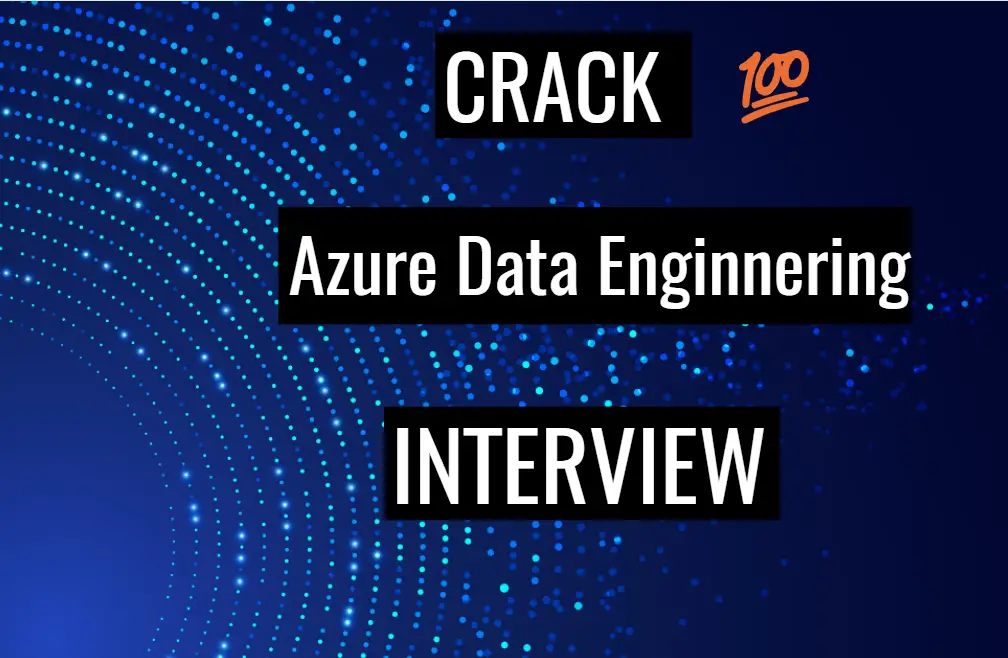In this post I will share most frequently asked azure data lake analytics interview questions. It includes azure data lake storage interview questions, azure data lake interview questions and answers, azure data lake analytics interview, azure data lake interview questions and answers for experienced, azure data lake analytics interview questions, azure storage interview questions, azure storage real time interview questions, azure blob storage interview questions, azure table storage interview questions, azure queue interview questions, azure data lake storage gen2 interview questions and azure data lake interview questions for experienced.
What is an Azure Data Lake ?
In simple words Azure data lake can be described as a building a capability which can store massive amount of data (i.e. azure data lake storage), having the power and tools to transform, analyze and process data of any size (i.e. azure data lake analytics, HDInsight) included with the security provided by (Azure IAM, Azure AD).
Whole idea of Azure Data lake is to create an enterprise data solution which can store massive amounts of data and jobs can be run on it without worrying of complexities of data ingestion and storage. Azure IAM is associated with it to provide high security to the data stored and execution permission.

What is Azure blob storage?
Azure blob storage is the basic storage solution. Here you can save massive amounts of data in the form of blobs. It can save any kind of file. You can treat it as google drive where you can dump any files or data you have. However it can only store files not the folder.
What is Azure data lake storage Gen1 / Gen2?
Azure data lake storage is the storage solution provided by Microsoft Azure. It is basically built on top of the azure blob storage only. It is mainly focused on providing support for big data analytics. ADLS is compatible with the Apache hadoop . Earlier if you want to run the workload in hadoop you have to move the data to hadoop HDFS. But now hadoop can access the azure data lake storage directly.
Besides these it also provided the hierarchical namespaces i.e you can create the folder/subfolders to store the data. Its aim is to provide high throughput over the petabytes of data.
What are the core features of the Azure blob storage service?
1. Durable and highly available.
2. Secure
3. Scalable
4. Managed
5. Accessible
What are the Azure core storage services?
Azure Blobs: Object store for storing text and binary data of any kind. Azure data lake storage Gen 2 which builds on top of It provides the hierarchical namespaces and supports high performance for big data analytics.
Azure Files: File share service managed by azure. Useful for cloud or on-premises deployments.
Azure Queues: It is a messaging service for providing message communication between different modules or applications. It is a highly scalable and reliable messaging solution.
Azure Tables: NoSQL storage for schemaless storage of structured data. Azure cosmos db is a good alternative to it.
Azure Disks: Block-level storage volumes for Azure virtual machines.
Azure Blob Storage scenarios base interview questions
Assume that you are working for XYZ organization as azure developer and your organization is moving to cloud from on premise location. As a part of this activity you may need some utility files and tools across multiple VMs. Which Azure storage solution would you prefer for this situation and why?
I will use Azure file shares. As we can mount azure file share from cloud or on-premises and this can be accessible from multiple machines.
Assume that you are working for XYZ organization as azure developer and your organization is moving to cloud from on premise location. As a part of this activity you may need to move data which could be further used by the data science team to run analytics. Which Azure storage solution would you prefer for this situation and why?
I will use Azure data lake storage Gen 2 (ADLS) as the storage solution. ADLS provides the highly scalable and performance optimized support for the big data analytics hence it would be the right choice here.
Get Crack Azure Data Engineer Interview Course
– 125+ Interview questions
– 8 hrs long Pre- recorded video course
– Basic Interview Questions with video explanation
– Tough Interview Questions with video explanation
– Scenario based real world Questions with video explanation
– Practical/Machine/Written Test Interview Q&A
– Azure Architect Level Interview Questions
– Cheat sheets
– Life time access
– Continuous New Question Additions
Here is the link to get Azure Data Engineer prep Course
Assume that you are working for XYZ organization as azure developer and your organization is moving to cloud from on premise location. As a part of this activity you may need to store data which is not to be accessed from outside the virtual machine to which the disk is attached.. Which Azure storage solution would you prefer for this situation and why?
Azure Disk would be the right choice here. Azure disks allow data to be persistently stored and accessed from an attached virtual hard disk.
Assume that you are working for ABC organization as azure architect and your organization is building enterprise solutions having multiple applications. As a part of this solution multiple components want to communicate with each other using the asynchronous messages. Which Azure storage solution would you prefer for this situation and why?
Azure Queues would be the right choice here. It allows asynchronous message queuing between application components.
Assume that you are working as a data engineer for Azurelib.com. Your application is storing the data with the cloud as your blob storage. Application is generating some reports which need to be accessible to third-party applications. However, you want this has to be accessible only for the next 7 days. After that, it should automatically not be allowed access to these reports. How could you solve this problem?
Application is generating the data into the Azure blob storage. We have SAS token available with azure storage solution. We can create a SAS token for these reports where we can mention the time duration of the next 7 days for this token. Share this SAS token with other applications so that they can use the token to get the reports. After the 7 days, this token automatically gets expires and will not allow to access anyone after the seven days.
Which protocol is used by the Azure file for accessing the share files?
Server Message Block (SMB) protocol is used by the Azure file share.
What is the maximum size of message that can be stored by the Azure queues?
Queue messages can be up to 64 KB in size. It is a scalable solution hence can store millions of messages. It is used to store lists of messages to be processed asynchronously.
What are the different authorization methods supported by Azure Storage?
1. Azure Active Directory (Azure AD) integration for blob and queue data.
2. Azure AD authorization over SMB for Azure Files.
3. Authorization with Shared Key.
4. Authorization using shared access signatures (SAS).
5. Anonymous access to containers and blobs. (For example static website using azure blob)
What do you mean by Encryption at rest in Azure?
Azure Storage encryption helps in protecting client’s data to meet client’s organizational security and compliance commitments. Azure Storage automatically encrypts all before storing it into the storage account and it decrypts it prior to retrieval. The encryption, decryption, and key management processes are transparent to users. Key for encryption and decryption can be chosen by the client.
What is Client-side encryption in Azure storage?
Azure provides the storage client libraries. It has methods for encrypting and decrypting the data. Clients can use these libraries to encrypt the data before sending to azure hence the data which is getting transferred over the network would be secure only.
What are different languages supported by azure Client libraries?
.NET
Java
Node.js
Python
Go
PHP
Ruby
Can we have two storage with the same name but in different resource groups?
No because the storage name needs to be unique across the azure namespace.
What are the different types of Azure blobs?
Block blobs
Append blobs
Page blobs
What are the different access tires for the azure blob storage?
Hot – It is optimized for storing data that is accessed frequently.
Cool – It is optimized for infrequently data accessed and stored for at least 30 days.
Archive – It is optimized for storing data that is rarely accessed and stored for at least 180 days.
What are the various option to Move data to Blob storage
AzCopy
Azure Storage Data Movement library
Blobfuse
Azure Data Box
Azure Import/Export service
Azure Data Lake Analytics Interview Question
What is Azure Data Lake Analytics?
Azure data lake analytics service provides the capabilities to do analytics over big data. It is as simple as firing the query over the data. There is no need to do any side work like deploying, configuring or hardware management. It is a scalable service to handle the job seamlessly over the massive data storage. Here focus would be on running the query directly on the existing data without provisioning the compute resources.
What are the features of the Azure data lake analytics?
Main features of Azure data lake analytics are as follows:
1. Cost effective: You don’t have to provision any hardware, license or any agreement. Its pay per use model with pay per job request. You can run any size of workload from terabytes to petabytes of data.
2. Support multiple data sources: You can run Azure data lake storage Gen1, azure sql db, azure synapse. Best performance can be obtained on ADLS.
3. Includes U-SQL query language similar to SQL to execute over the massive amount of big data.
4. It creates the visualization of job like below, which can help you to analyze, debug and optimize your job.

How to create the Azure data analytics account?
It can be created in multiple ways :
1. Using Azure portal
2. Using Azure CLI
3. Using Azure Visual Studio
4. Using Azure Power shell
What is the command to create the Azure data analytics account using the Azure cli?
az dla account create –account “<Data Lake Analytics Account Name>” –resource-group “<Resource Group Name>” –location “<Azure location>” –default-data-lake-store “<Default Data Lake Store Account Name>”
What is U-SQL?
U-SQL is the sql kind of big data query language for the Azure Data Lake Analytics service. It helps to read, filter, transform and write data. It supports Azure Data Lake Storage, Azure Blob Storage, and Azure SQL DB, Azure SQL Data Warehouse, and SQL Server instances running in Azure VMs as the data sources.

You would also like to see these interview questions as well for your Azure Data engineer Interview :
Azure Databricks Spark Tutorial
Real time Azure Data factory Interview Questions and Answers
Azure Devops Interview Questions and Answers
Azure Active Directory Interview Questions and Answers
Azure Databricks Spark Interview Questions and Answers
Final Thoughts
If you are reading up to this point, congratulations you have moved one more step closer to your dream Azure job. By this you have prepared for azure data lake storage interview questions, azure data lake interview questions and answers, azure data lake interview questions and answers for experienced, azure data lake analytics interview questions, azure storage interview questions, azure blob storage interview questions, azure table storage interview questions, azure queue interview questions, azure data lake storage gen2 interview questions and azure data lake interview questions for experienced.
You may also like to read :
Mostly asked Azure Data Factory Interview Questions and Answers

